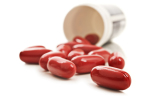- FreeTrainers.com Forums
- Health Supplements
- different types of weight gainer
Group: Health Supplements
Created: 2012/01/01,
Members: 101,
Messages: 16613
Supplements can be a great aid with your health and fitness goals. Combined with the proper exercise and nutritional plan they can be quite effective.
Join group
different types of weight gainer

Garym1976
Posts:
17
Joined: 2002/04/09  |
2002/04/24, 08:23 PM
I'm on the 12 week mass building routine.This weekend I plan to go and buy some weight gainer.I was thinking about getting 1 whey , 1 soy and 1 vegetable weight gainer.Is that a good idea or should I just stick with whey?Also if I get all 3 kinds should I mix them or take each seperatly. |
|
| |

rev8ball
Posts:
3,081
Joined: 2001/12/27  |
2002/04/25, 05:48 AM
whey and a milk/egg proteins are your best bets. whey is best taken after your workout (rapid assimilation), while the milk/egg are best for the rest of the day (slow assimilation). also, a weight gainer is different from just a protein powder. if you are planning on putting on size and strength, you will need plenty of carbs as well, which is where the weight gainer can come in handy: it should have ample proteins as well as ample carbs. -------------- Michael "Trample the weak; hurdle the dead!" |

francs
Posts:
40
Joined: 2002/04/07  |
2002/04/26, 07:58 AM
I am taking a weight gainer that has a carb/protein ratio of 1.3 (65gms carbs/50gms whey x serving). Would i be better off with something like 2:1 carb:protein? I must say that most of my caloric intake comes from normal food (6/7 times daily) and I drink one shake in the morning and one after working out (gym days) or at some time in the afternoon on "non-working" days. PS lovely line there with the signature.. :P -------------- Fran |

rev8ball
Posts:
3,081
Joined: 2001/12/27  |
2002/04/26, 11:56 AM
particularly after the gym (the golden hour), your meal should be 2:1 carb:protein (whey), for example, 100g carbs to 50g protein. as for the the rest of the day, something like what u have (65:50) is okay. just dont forget to mix your proteins.thats good u get most of your calories from whole food; these things r called supplements for a reason - they add to our diet of real food. hope that helps. thanks for the remark on my tagline... hey, its me (LOL)! -------------- Michael "Trample the weak; hurdle the dead!" |

francs
Posts:
40
Joined: 2002/04/07  |
2002/04/28, 02:06 PM
Thanks for your help Michael. Yes that does help.The tagline is gr8.. :0) Btw Ive got one question i couldnt get answered. Do you know the difference between all these protein types? I mean the whey concentrate, isolate, CFM, ion exchanged.. blabla. They get me confused all the time. Are there big differences? Or is it just the names... -------------- Fran |

rev8ball
Posts:
3,081
Joined: 2001/12/27  |
2002/04/29, 02:03 AM
Whey Protein Concentrate (WPC): Once discarded as "waste", the popularity of whey has increased dramatically in recent times because of advances in processing technology. Whey begins as a watery byproduct of cheese manufacturing. In its crude state, whey is about 93% water, 6.5% lactose, 0.9% protein and 0.2% vitamins, minerals, and fat-soluble nutrients. In this form, whey is not of much benefit to athletes, but with gentle low-temperature processing and filtration, this liquid can be stripped of most of its lactose, fat, cholesterol and water to yield concentrated whey powders containing anywhere from 34 to 89% protein. It is important to note that there are significant price and nutrtional value differences between the various WPCS on the market. A WPC containing 34% protein may cost up to 80% less than better quality whey protein concentrates with protein contents of 77% or higher. Most protein powders use a blend of different whey protein concentrates, isolates and hydrolysates, making it possible to hide inferior/cheaper proteins in a product. Whey Protein Isolates (WPIs): Crude, or sweet dairy whey, can also be "isolated" via cross flow microfiltration (CFM) or ion exchange (IE) processes to produce whey powders that are virtually fat, carbohydrate (lactose) and cholesterol free. By definition WPIs contain >90% protein by dry weight. There are a few premium supplements that derive all of their protein content from WPIs, but WPIs are most often used in conjunction with Whey Protein Concentrate (WPC) and /or other proteins to boost the overall protein content of a supplement. Cross Flow Microfiltration (CFM) is a solvent-free process that uses natural ceramic filters to separate whey proteins from a variety of undesirables (i.e. fat, cholesterol, lactose, etc.). Advantages to this process include minimal protein denaturation, preserved protein microfractions and a better mineral profile. Whey, like many other proteins, including egg, soy and casein, is actually a family of different smaller proteins called microfractions. Glycomacropeptides, alpha-Lactalbumin, Lactoferrin, Lactoperoxidase, and Immunoglobulins are some examples that you may have read about in magazines or seen on labels. Because there is some indication that these protein fractions may play a role in appetite regulation, immune functioning, neutralizing free radicals and more, many people prefer CFM since it is better at preserving some of these fractions than Ion-Exchange. CFM is also generally higher in calcium and lower in sodium than IE as a result of differences in processing methods. Ion-Exchange (IE) is a process that separates proteins on the basis of their electrical charge. Unlike CFM, ion-exchange requires the use of various solvents to create an attractive charge on the proteins. Once charged, these proteins migrate toward oppositely charged resin beads in the reaction vessel. The protein can be later removed from the resin beads by reversing the charge to result in a highly purified WPI. Ion-exchange WPIs are not typically considered as "native" (maintaining the same microfraction ratios found in milk) as CFM isolates, but they are richer in total protein - containing upwards of 97% by dry weight - and are, therefore, a popular choice among bodybuilders and athletes. Hydrolyzed Whey Peptides (HWP): debatably the best - at least in terms of bioavailability - whey proteins that money can buy. HWPs are short chains of amino acids (e.g. di-, tri-, poly-peptides) produced by strategically digesting (with enzymes) various bonds in whole whey proteins. Preliminary research suggests that HWPs are more easily absorbed (and probably utilized) than any other protein that we know of. Unfortunately, HWPs have an extremely bitter taste, so they can only be used in conjunction with other proteins and added in relatively small amounts. (courtesy of nutrition-center.net) -------------- Michael "Trample the weak; hurdle the dead!" |

francs
Posts:
40
Joined: 2002/04/07  |
2002/04/29, 08:39 AM
This is REALLY exhaustive. Thanks A LOT. It does clarify things somehow. One more question if thats not too much bugging you (lol hope not..). Which do you think is best?Atm what I have is a mass gainer and a protein supplement (actually its an MRP) that contain WPCs and WPIs (label doesnt say in what ratio to e/o). Thanks a lot again for your answers anyway. You are THE man here .. :P -------------- Fran |

rev8ball
Posts:
3,081
Joined: 2001/12/27  |
2002/04/29, 12:41 PM
like i had mentioned before, there is no single "best" form of protein (just to make our lives more difficult...LOL). u have some that are better than others, particularly on when and for what you're taking them for. as for whey, though, the best one for it so far seems to be the HWP.hope that helps..... -------------- Michael "Trample the weak; hurdle the dead!" |

francs
Posts:
40
Joined: 2002/04/07  |
2002/05/01, 12:16 PM
right. Thanks Michael. All helped a lot. I will probably try a bit of everything, since so far I have never been sticking to a single whey type for more than say two months. I guess hydrolysates is what HWP in the end can also be called commercially. I am going to have a supp which contains that, next month. I was also thinking of supplementing once or twice a day with Prolab's N-Large 2 as I have seen you have rated that thing quite ok... :P.Anyways, thanks a lot for all your help and suggestions. Imma have my recovery meal now.. pasta n tuna .. yummyy.. -------------- "Lift or die, huh?" hehehe... lmao.. :0) -------------- Fran |
